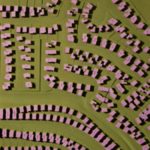REEF CYCLE-YEOSU PAVILLION by Zago Architecture
Project's Summary
The REEF CYCLE-YEOSU PAVILLION, designed by Zago Architecture, is a groundbreaking project that redefines the relationship between architecture and nature. Located in Yeosu, South Korea, this pavilion is not just a structure; it is a dynamic entity that interacts with its environment. The pavilion serves as a testament to the potential of architecture to evolve and participate actively in ecological processes, particularly within marine ecosystems. It was conceptualized for the 2012 World Expo, encapsulating the theme of the ocean and its vital role in our planet's health.

What sets the REEF CYCLE apart is its commitment to transforming architectural permanence into a responsive and living process. Rather than being a static monument, the pavilion is designed to adapt and change, mirroring the natural rhythms of the ocean. Traditional architecture often emphasizes fixed forms that resist alteration; however, the REEF CYCLE embraces change as a fundamental aspect of its existence. This innovative approach allows the pavilion to not only represent the ocean but to become an integral part of its ecological fabric, fostering a deeper connection between people and the marine environment.

Architectural evolution is at the heart of the REEF CYCLE's design philosophy. Zago Architecture envisions buildings as living organisms capable of responding to their surroundings. This perspective challenges the conventional mindset of permanence in architecture, suggesting instead that buildings should be designed with adaptability in mind. By incorporating elements that allow for transformation, the REEF CYCLE aims to facilitate a dialogue between structure and nature, encouraging occupants to engage with their environment in meaningful ways.

Moreover, the pavilion plays a critical role in marine life rehabilitation efforts. By integrating sustainable practices and materials, the REEF CYCLE contributes to the health of the ocean ecosystem. It demonstrates how architecture can transcend mere aesthetics and functionality, evolving into a proactive participant in environmental stewardship. The pavilion's design incorporates features that enhance biodiversity and promote ecological awareness, ultimately transforming it into a sanctuary for both local marine life and visitors alike.
In conclusion, the REEF CYCLE-YEOSU PAVILLION is a visionary project that encapsulates the essence of adaptive architecture. Zago Architecture has successfully crafted a space that not only serves as a physical representation of the ocean's beauty but also actively participates in its preservation. By challenging traditional notions of permanence and embracing the fluidity of life, the pavilion stands as a beacon of hope for future architectural endeavors, inspiring a harmonious relationship between built environments and natural ecosystems.
Read also about the Casa PM: An Introverted Architectural Gem project



